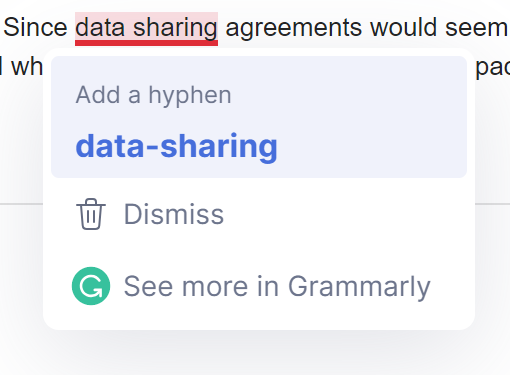This morning, while I was banging out an email, Grammarly saw fit to offer the following suggestion:

Hmm. Interesting. Should we say data-sharing agreement, not data sharing agreement?
Some background is in order. This is from Garner’s Modern English Usage 827 (5th ed.):
When a phrase functions as an adjective preceding the noun it modifies … the phrase should ordinarily be hyphenated. Hence the soup is burning hot becomes the burning-hot soup; the child is six years old becomes the six-year-old child (or the six-year-old).
Garner goes on to say “Some guides might suggest that you should make a case-by-case decision, based on whether a misreading is likely. You’re better off with a flat rule (with a few exceptions noted below) because almost all sentences with unhyphenated phrasal adjectives will be misread by someone.”
In data sharing agreement, the phrase data sharing functions as an adjective preceding agreement, so according to Garner it should be hyphenated.
Let’s see how that might play out. Here are some contract titles I plucked from the primordial ooze of the SEC’s EDGAR system. I’ve hyphenated the phrasal adjectives:
- stock-purchase agreement
- executive-officer agreement
- reserve-account security agreement
- independent-director agreement
- warrant-assignment-and-assumption agreement
- credit-assignment agreement
- mutual termination-and-release agreement
- first-lien pari-passu credit agreement
- registration-rights agreement
- real-estate-purchase agreement
- cost-reimbursement agreement
I suggest that for two reasons, this ain’t happening. First, for purposes of contract names, reader miscues are highly unlikely. No sane reader of contracts would, for example, think momentarily that executive officer agreement refers to a fancy version of an officer agreement, or that real estate purchase agreement refers to an estate purchase agreement that is real and not a fiction.
And second, hyphenated phrasal adjectives in contract names are vanishingly rare. Specifically, in a few minutes on EDGAR and Google, I didn’t find a data sharing agreement that hyphenated data-sharing.
I’m a fan of hyphenated phrasal adjectives; if you’re not familiar with the concept, I recommend you remedy that. But I don’t plan on hyphenating phrasal adjectives in contract names.

Ken:
Also, most contract names are stock phrases. Everyone knows what the title asset purchase agreement refers to. Because the whole title is a stock phrase, it’s less likely to be ambiguous. If you come up with a creative title for your agreement, you might be more likely to need hyphenation.
Chri
Chri:
Don’t you agree it was nicer when Ken used a system that let commenters go in after the fact and fix typos in their comments?
Wright
Write:
Yes, definitel
Chri
So the likelihood of seeing a publication by “Adams-On-Contract-Drafting” might be exceedingly low, I understand.
Just for fun, consult Google Nram. It uses a corpus that is more general than Edgar.
https://books.google.com/ngrams/graph?content=data-sharing+agreement%2C+data+sharing+agreement&year_start=1800&year_end=2019&corpus=en-2019&smoothing=3
Good idea! I used Ngrams in my 2019 article on efforts provisions.